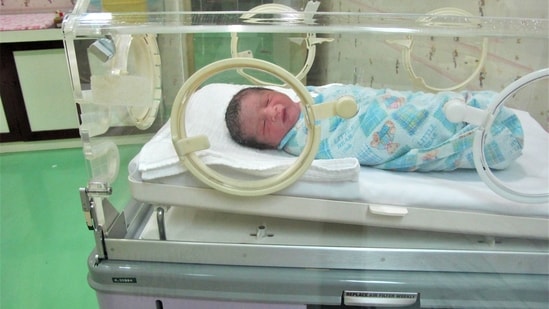Congenital disorders
Newborn screening: What it is, how is it done, ideal time for test, why is it important and more
Health expert reveals all you need to know about what happens when your newborn is screened at birth, when, why and which babies is it for
Newborn screening is an essential tool to diagnose many diseases in the babies which otherwise are extremely difficult to be picked up at the right time but when picked at correct time they can be offered the right treatment for their healthy survival hence, health experts insist that all babies should undergo metabolic screen, hearing screen and critical congenital heart disease screen. In short, newborn screening refers to screening of newborn babies, shortly after birth, for disorders some of which may be potentially fatal that are treatable but cannot be picked on routine examination of baby.
Q What is a metabolic disorder and how common are they in our country?
In an interview with HT Lifestyle, Dr Abhishek Chopra, Consultant Neonatologist and Paediatrician at Cloudnine Group of Hospitals in New Delhi’s Punjabi Bagh, answered, “A metabolic disorder is one that gets in the way of how the body breaks down food, absorbs nutrients, or handles enzymes. Left untreated, some of these disorders could affect a baby’s development. They can cause organ damage or even death. Nearly 2.5 crore babies are born in India annually and 25,000 of these have metabolic disorders (ICMR data). The three most common metabolic disorders in India are congenital hypothyroidism a disease in which thyroid gland is not functional and not treating it at right time can result in mental retardation. The other two diseases are G6PD deficiency ,a disease in which G6PD enzyme is less in the red blood cells making them more prone to breakage and congenital adrenal hyperplasia which if untreated can result in genital abnormalities and also can be fatal in many cases.”
Q What are the disorders for which all new needs must be screened?
Dr Abhishek Chopra revealed, “All countries choose the set of disorders depending on the epidemiologic prevalence and resources in India .The diseases included in the core panel are those which are listed above along with hearing and critical congenital heart disease screen.”
Q What is the ideal time of this test and how are the tests done?
According to Dr Abhishek Chopra, samples are usually collected after 72 hours and within seven days of life. Blood spots are collected by heel prick. Three to five blood spots are collected and put on a filter paper card which is dried at room temperature and then sealed and sent to the laboratory for testing.
Q If a child is diagnosed with any of the diseases through screening tests, is there any available treatment ?
Dr Abhishek Chopra said, “Yes. For congenital hypothyroidism and congenital adrenal hyperplasia oral tablets are started and G 6PD deficiency will just require avoidance of certain drugs and foods.”
Q What is hearing screening and why is it important?
“Significant hearing loss occurs in 1 to 2 babies per thousand babies who are born. Hearing impairment is one of the most critical sensory impairment with significant social and psychological consequences .Failure to detect children with hearing loss may result in lifelong deficits in speech, language and poor academic performance,” informed Dr Abhishek Chopra.
Q When and how is the hearing screening done?
Dr Abhishek Chopra explained, “All newborns should undergo hearing screening by one month of age. Most commonly used test is OAE (Oto acoustic emissions). In this test a small probe is placed in child’s ear canal, click sounds are delivered and response is recorded. The goal of the hearing screen is to screen all babies before one month of age, diagnose hearing loss before three months of age and start treatment before 6 months of age.”
Q Why should all newborn babies undergo hearing screening?
As per Dr Abhishek Chopra, all newborns should undergo hearing screening because about 50% of babies with hearing loss are absolutely well and have no risk factors for hearing loss.
Q Do neonates undergo screening for congenital heart diseases?
Dr Abhishek Chopra answered, “Yes. The incidence of critical congenital heart disease is 1.8 to 2 per 1000 live births. Critical congenital heart disease is the one which needs some intervention either medical or surgical and if it is not done at right time can be fatal.”
Q Which babies need to be screened? When and how is it done?
Dr Abhishek Chopra concluded, “All newborns should undergo the screening. This screening is done after 24 hours of life and before the discharge of baby .To do this screening a pulse oximeter probe device which measures oxygen levels is placed on the right hand and the foot and doctor based on the oxygen levels decides whether baby has passed the test or failed. If baby fails the test, baby will further undergo echo cardiography to look for the presence of heart disease. Many of the babies who are diagnosed with heart disease need urgent medical or surgical treatment.”
 Subscribe today by clicking the link and stay updated with the latest news!” Click here!
Subscribe today by clicking the link and stay updated with the latest news!” Click here!
